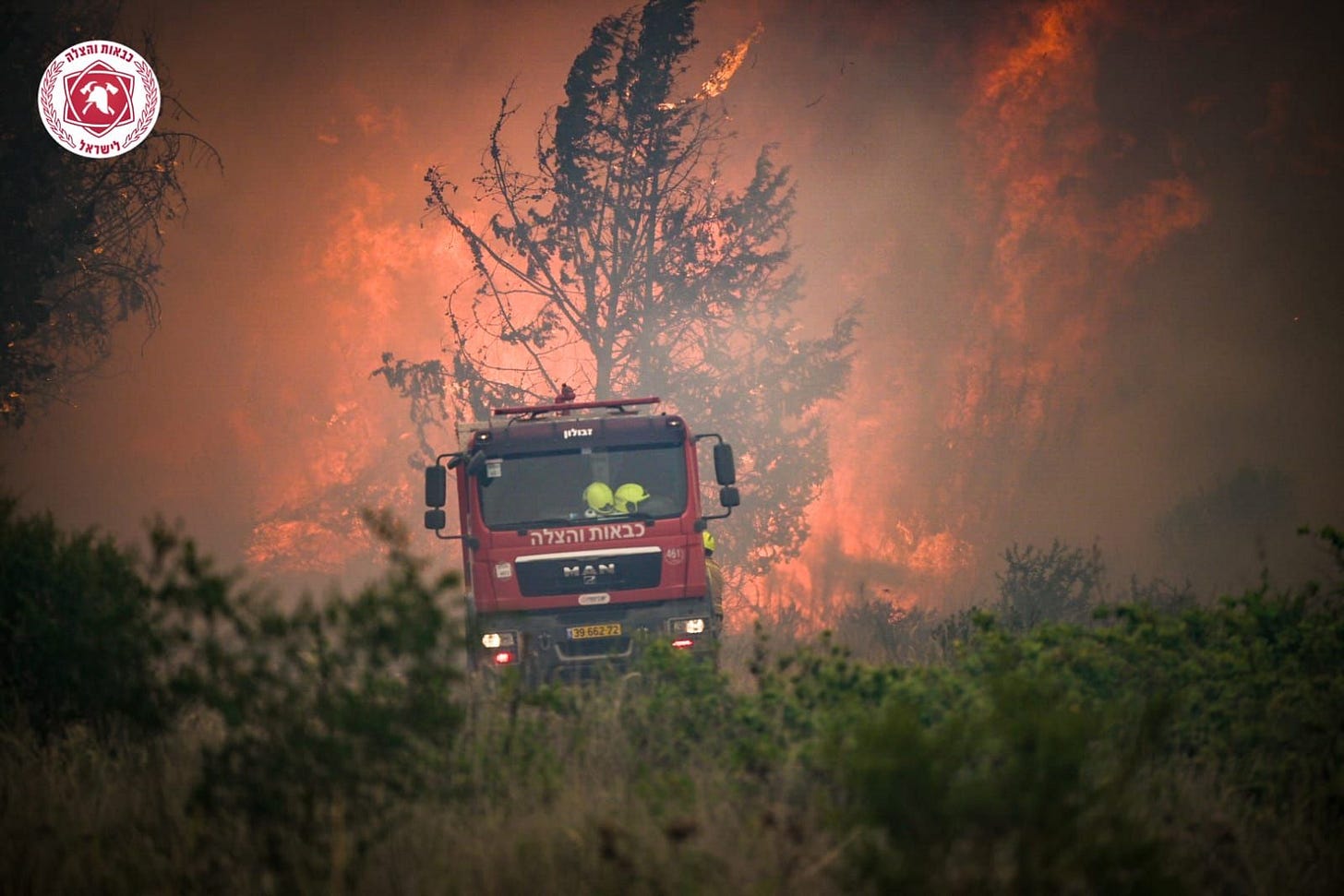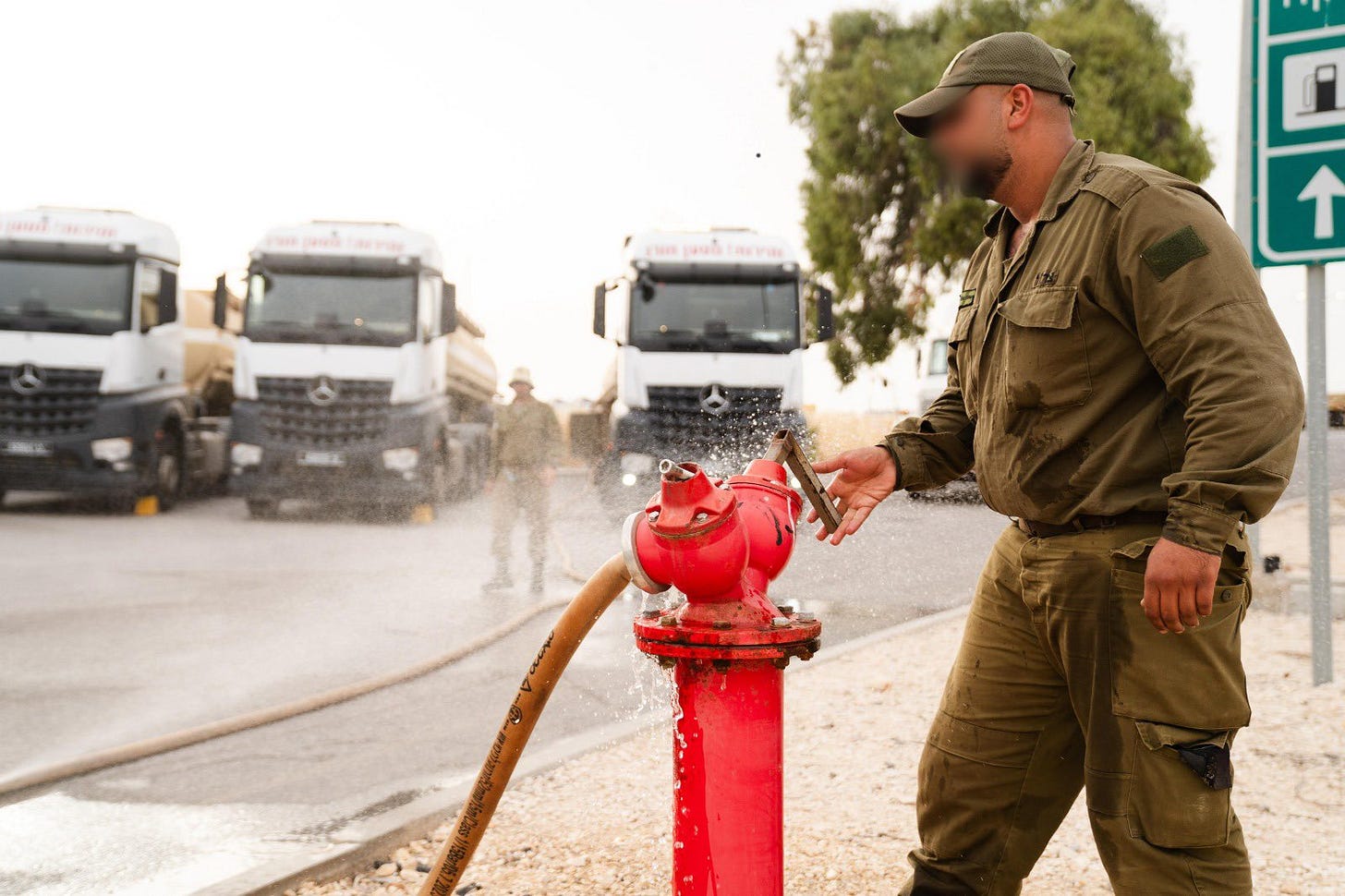Arson terrorism against Israel reveals the Palestinian goal once again.
If you genuinely cared for Palestinian well-being, you would never encourage setting fire to the very land Palestinians also claim indigeneity.

Please consider supporting our mission to help everyone better understand and become smarter about the Jewish world. A gift of any amount helps keep our platform free of advertising and accessible to all.
You can also listen to the podcast version of this essay on Apple Podcasts, Google Podcasts, and Spotify.
Flames tore through the hills west of Jerusalem this week — leading up to and during Israeli Independence Day on Thursday — as scorching heat and fierce winds led to one of the worst wildfire disasters in Israel’s history.
Entire communities were evacuated. National parks emptied. Roads connecting major cities Jerusalem and Tel Aviv shut down, along with all transit between them. It wasn’t just the trees and wildlife that were endangered; human lives, homes, and hospitals sat in the path of destruction.
The fires were so widespread and overwhelming that they stretched the resources of Israel’s firefighting service, prompting the Israel Defense Forces to join the effort and pleas for international aid.
While 163 fire crews and the Israel Defense Forces battled the blazes on the ground, another fire raged online: Palestinian extremists flooded social media with videos cheering the fires on, spreading hashtags glorifying arson, and urging others to “ignite the land” beneath Jewish feet.
These were not anonymous trolls or fringe accounts. These were organized campaigns of celebration, broadcast in Arabic, in full view of the world, treating the suffering of millions as cause for jubilation, similar to how Palestinian terrorists GoPro’d the October 7th attacks and broadcast them to the world as well.
Let’s be absolutely clear about what this is not — activism. Neither is it “resistance” nor “pro-Palestinian.” It is pro-terrorism. And more specifically, it is terrorism rooted in a singular obsession — harming Jews.
This obsession isn’t new, but it is foundational. The bedrock of modern Palestinian nationalism (which only became a “thing” in the 1960s despite the Palestinians dubiously claiming indigeneity) has, since its inception, been built not on dreams of peace, coexistence, or a better future for children in Gaza or Ramallah — but on the systematic use of terror as a political and cultural weapon against Jews.
Palestinianism, as it has been popularly practiced and promoted, is not primarily a civil rights movement; it is a grievance cult rooted in violence against Jews. The list of examples is exhaustive, but here are just a few.
In the 1920s and 1930s, the figurehead of Palestinian nationalism, Haj Amin al-Husseini, the Grand Mufti of Jerusalem, incited anti-Jewish pogroms across British Mandatory Palestine.
In 1929, his inflammatory sermons and false claims that Jews were threatening Muslim holy sites sparked the Hebron massacre, in which 67 Jews were slaughtered in their homes and synagogues by Arab neighbors. That ancient Jewish community, centuries old, was wiped out.
Al-Husseini later aligned himself with Adolf Hitler, recruited Muslims for the SS, and urged the Nazis to extend the Holocaust to the Jews of Palestine.
Decades later, Palestinian terrorist groups like the Popular Front for the Liberation of Palestine globalized their hatred through a string of airplane hijackings in the 1970s. In 1970, they hijacked four commercial jets and held over 300 hostages in Jordan’s Dawson’s Field, eventually blowing up the planes for the world’s cameras.
In 1974, three Palestinian terrorists infiltrated Israel from Lebanon and took over 100 high school students hostage in the Ma’alot schoolhouse, demanding the release of imprisoned terrorists. When the IDF tried to rescue the children, the terrorists threw grenades and opened fire, murdering 22 children and injuring dozens more. The goal was never negotiation; it was mass slaughter, and children were the target. And the perpetrators were not condemned in Palestinian society; they were celebrated as “martyrs.”
In 1976, Palestinian and German terrorists hijacked an Air France plane and diverted it to Entebbe, Uganda, separating the Jewish passengers — a literal reenactment of Nazi tactics — until Israeli commandos freed them in a daring rescue operation.
In 1980, a group of terrorists affiliated with the Palestine Liberation Organization crossed the border from Lebanon under cover of night and infiltrated Kibbutz Misgav Am, a peaceful community near the Galilee. Armed with assault rifles and grenades, they broke into the babies’ and toddlers’ dormitory, where a kibbutz nurse was caring for 11 sleeping children, all under the age of 5. They opened fire, killed the kibbutz secretary and a soldier, and then barricaded themselves inside the nursery.
Then, in an act of pure savagery, one of the terrorists walked up to a crib and executed 2-year-old Eyal Gluska — shooting him in the head at point-blank range, in front of the other crying, terrified infants. The nurse, though wounded, shielded as many children as she could with her body until Israeli commandos arrived. During the rescue operation, a firefight ensued, the terrorists were killed, and the surviving children were pulled from the blood-soaked nursery — some wounded, all traumatized.
Let that sink in: The targets were babies. The message was unambiguous: No Jew, not even an infant, is innocent in their eyes.
In 2000, during the early days of the Second Intifada, two Israeli reservists, Vadim Nurzhitz and Yossi Avrahami, mistakenly entered Ramallah and were taken into Palestinian police custody. A mob stormed the station, lynched them, mutilated their bodies, and threw one out the window to a cheering crowd. A man appeared at the window with blood-soaked hands, raising them in triumph as the crowd below roared in celebration. This was not fringe behavior. This was mass participation, collective joy in butchery.
And then came the Second Intifada (2000 to 2005), a campaign not of guerrilla resistance, but of targeted civilian murder. Suicide bombers blew up buses, cafés, and dance clubs with horrifying regularity.
In 2001, a Hamas bomber entered the Sbarro pizzeria in Jerusalem at lunchtime, killing 15 people, including seven children, and wounding over 130. That same year, the Dolphinarium discotheque in Tel Aviv, filled with teenagers, was attacked, killing 21 and injuring more than 100. In 2002, the Passover massacre at the Park Hotel in Netanya left 30 dead as they gathered for a seder meal. These weren’t military targets. They were Jews — singled out for living, celebrating, eating.
Each of these atrocities was celebrated. “Martyrs” were honored with posters, songs, and children’s books. Streets were named after bombers. Widows were paid stipends by the Palestinian Authority. Terror was not the price of politics; it was the politics.

Thus, these events reveals a consistent through-line: terrorism as identity, violence as doctrine, and antisemitism as strategy. The fires being celebrated today are simply the latest page in a blood-soaked manual that sees Jewish suffering not as tragedy, but as triumph.
Palestinian terror isn’t the exception; it’s the norm. The glorification of “martyrs” who blow up children on buses, the naming of public squares after murderers, the indoctrination of schoolchildren with fantasies of stabbing Jews, the grotesque chants of “death to the Jews” at rallies — all of this is not fringe. It is mainstream.
The 1990s Oslo Accords (a series of agreements between Israel and the Palestine Liberation Organization) didn’t change this. Neither did Israeli withdrawals from southern Lebanon in 2000 or Gaza in 2005. Terror is not a means to an end for many of these actors; it is the end. Because in this worldview, the Jewish presence itself is the problem. And if that presence cannot be negotiated out of existence, it must be burned, bombed, or knifed out.
The wildfires are simply the latest manifestation of that pathology. Trees instead of buses. Matches instead of explosives. But the motive remains unchanged: destruction for the sake of Jewish death and disappearance.
If you genuinely cared for Palestinian well-being, you would never encourage setting fire to the very land Palestinians also claim indigeneity. These aren’t surgical strikes. Wildfires don’t carry passports. Flames devour hills and homes without checking the ethnicity of who lives nearby. The air thick with smoke isn’t segregated. And yet, arson is being treated by some as an acceptable, even noble, form of warfare.
It is a grotesque inversion of morality: Destroy forests, burn down villages, and choke the air with ash — all in the name of “liberation.” And yet, these same voices will scream about environmental damage when it suits their narrative. They will wax poetic about olive trees and ancestral lands — until it is Jews who are planting them, or Jews who are being driven from them by fire.
There’s a word for this: hypocrisy. There’s another word for it, too: antisemitism.
You cannot call yourself a defender of the land while cheering as it burns. You cannot pretend to support human rights while praying for civilian evacuations to become mass casualties. And you cannot claim moral high ground while weaponizing nature itself against innocent people.
The fires ignited this week aren’t just a natural disaster; they are a moral one. And every post that glorifies this destruction exposes a hard truth: For many who claim to be “pro-Palestinian,” the primary goal isn’t the dignity or safety of Palestinians. It’s the pain of Jews.
You want to know how you can tell the difference between a true advocate for Palestinian rights and a propagandist for hatred? Look at what they do when Israelis are in danger. Look at whether they mourn or rejoice, or simply stay silent (which is a form of complicity). If you celebrate arson, you’re not standing for peace; you’re dancing on the embers of shared humanity.
Israel will recover. It will replant its forests, rebuild its homes, and protect its people — as it always does. But the moral scorched earth left behind by those who cheer for terror may be harder to rehabilitate.
Because what burns brightest right now isn’t just the forest. It’s the hatred — undeniable, unapologetic, and utterly unconcerned with the lives it endangers on both sides of the fence.
And that hatred has nothing to do with freedom. It has everything to do with a deep-seated hatred of Jews.


I hope Israel has a secret plan to take care of this problem permanently. All Palestinians know is destruction and hate. The idea that there is a belief a negotiation could actually take place is a farce. They don't care about negotiations; they only care about the death of Jews. We've seen over and over again that anything "agreed" upon by them is not to be trusted. I heard they picked up several of these arsonists. If they are members of families who live in Israel, their families should be removed from Israel. There should be no tolerance for any of it, or they will continue to find more ways to wipe out Israelis.
WHEN will Israel finish the job? There is no living side-by-side with any of them, and the new Middle East plan must get underway and get the terrorists (including the civilian terrorists) OUT. I'm getting so frustrated. And they are still holding hostages. What happened to "Release the hostages now or all hell will break loose?" FINISH IT.